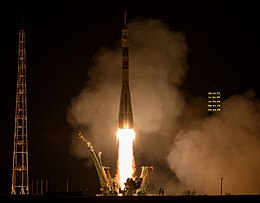Soyuz MS-12
 The launch of Soyuz MS-12 | |
| Operator | Roscosmos |
|---|---|
| COSPAR ID | 2019-013A |
| SATCAT no. | 44069 |
| Mission duration | 202d 15h 46m |
| Distance travelled | 86.1 million miles.[1] |
| Orbits completed | 3,248 [2] |
| Spacecraft properties | |
| Spacecraft | Soyuz Spacecraft |
| Spacecraft type | Soyuz-MS 11F747 |
| Manufacturer | RKK Energia |
| Crew | |
| Crew size | 3 |
| Members | Aleksey Ovchinin Nick Hague |
| Launching | Christina Koch |
| Landing | Hazza Al Mansouri |
| Callsign | Бурлак/Burlak[3] |
| Start of mission | |
| Launch date | 14 March 2019, 19:14:08 UTC[4][5] |
| Rocket | Soyuz-FG |
| Launch site | Baikonur Pad 1/5 |
| End of mission | |
| Landing date | 3 October 2019, 10:59 UTC [2] |
| Landing site | 47°24'04.44"N, 69°34'14.1"E[2] |
| Orbital parameters | |
| Reference system | Geocentric |
| Regime | Low Earth |
| Inclination | 51.6°[5] |
| Docking with ISS | |
| Docking port | Rassvet nadir |
| Docking date | 15 March 2019, 01:01 UTC[2] |
| Undocking date | 3 October 2019, 07:37 UTC[2] |
| Time docked | 202d 6h 36m |
 (l-r) Koch, Ovchinin and Hague Soyuz programme (Crewed missions) | |
Soyuz MS-12 was a Soyuz spaceflight which launched on 14 March 2019, carrying three members of the Expedition 59 crew to the International Space Station.[6] The mission ended on 3 October 2019, when Soyuz-MS-12 (carrying Ovchinin, Hague, and spaceflight participant Hazza Al Mansouri) successfully landed.
Crew[edit]
| Position | Launching Crew member | Landing Crew member |
|---|---|---|
| Commander | Expedition 59/60 Third[a] spaceflight | |
| Flight Engineer 1 | Expedition 59/60 Second[a] spaceflight | |
| Flight Engineer 2/Spaceflight Participant | Expedition 59/60/61 First spaceflight |
First spaceflight |
Backup crew[edit]
| Position | Crew member | |
|---|---|---|
| Commander | ||
| Flight Engineer 1 | ||
| Flight Engineer 2 | ||
Original crew[edit]
| Position | Launching Crew member | Landing Crew member |
|---|---|---|
| Commander | Expedition 59 Third spaceflight | |
| Flight Engineer 1 | Expedition 59 First spaceflight | |
| Spaceflight Participant | First spaceflight |
N/A |
Original backup crew[edit]
| Position | Crew member | |
|---|---|---|
| Commander | ||
| Flight Engineer 1 | ||
| Flight Engineer 2 | ||
Soyuz MS-12 was scheduled to be the debut flight for Hazza Al Mansouri or Sultan Al Neyadi, the first two astronauts from the United Arab Emirates, but this was delayed to flight Soyuz MS-15 following the Soyuz MS-10 mission failure.[10]
Notes[edit]
- ^ a b Counting the aborted flight of Soyuz MS-10, even though this did not quite cross the Kármán line. This matches NASA's count, though RSA follows the Kármán line definition.[6]
References[edit]
- ^ NASA Astronaut Nick Hague, Crewmates Return Safely from International Space Station
- ^ a b c d e Soyuz MS-12
- ^ "Центр подготовки космонавтов им. Ю.А.Гагарина. Официальный Web-сайт". www.gctc.ru (in Russian).
- ^ Pietrobon, Steven (9 January 2019). "Russian Launch Manifest". Retrieved 9 January 2019.
- ^ a b "Spaceflight mission report: Soyuz MS-12". www.spacefacts.de.
- ^ a b Gebhardt, Chris (14 March 2019). "Soyuz MS-12 docks with the Space Station – NASASpaceFlight.com". NASASpaceflight.com.
- ^ "Unable to get to the ISS, the crew of the Soyuz will try again on March 1". Interfax.ru (in Russian). 26 November 2018. Retrieved 28 November 2018.
- ^ "Астронавт НАСА Хейг может отправиться в космос на год, сообщил источник". РИА Новости (in Russian). 13 January 2019.
- ^ Evans, Ben (8 March 2019). "On International Women's Day, NASA Looks Forward to First All-Female EVA in Late March; Koch Tapped for Longer ISS Stay". AmericaSpace.
- ^ Ryan, Patrick (27 January 2019). "UAE's astronauts in training try out zero gravity". The National. Retrieved 23 February 2019.



